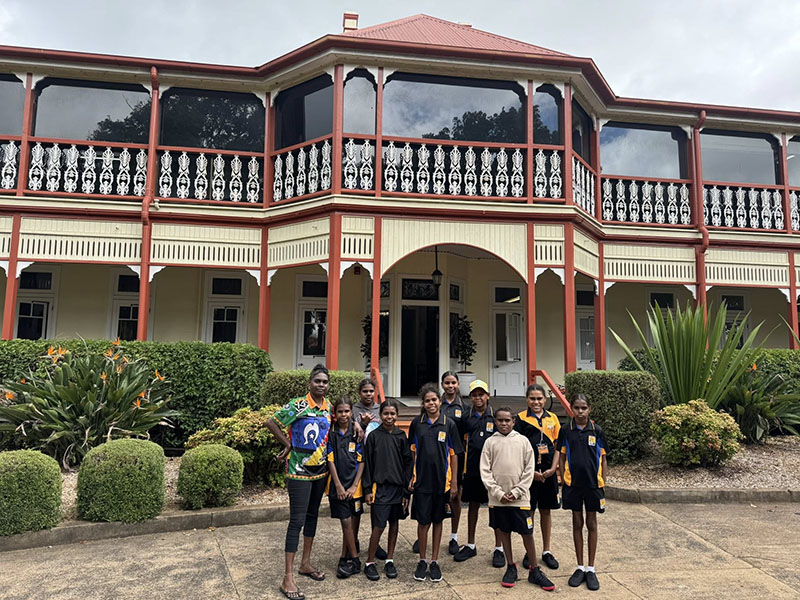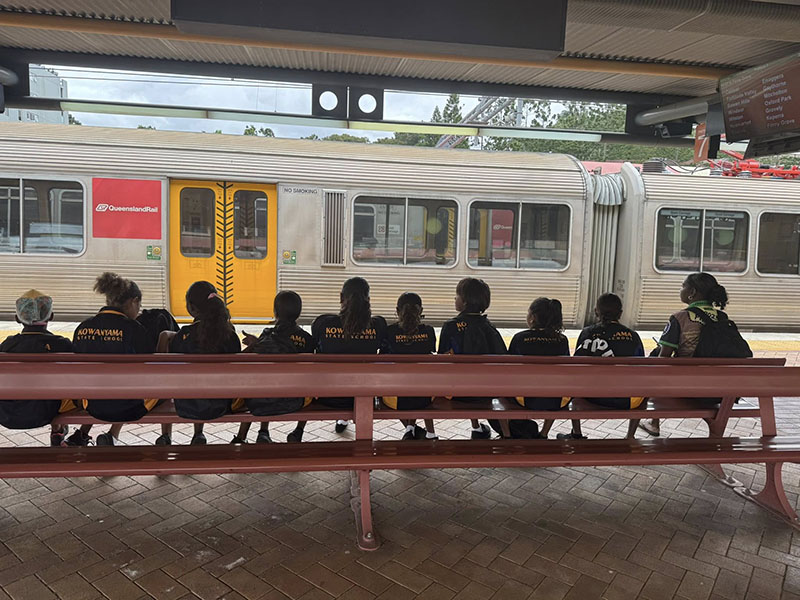Year 5 student Kenny stands at the edge of the South Bank pool, the midday sun glinting off the water. Around him, classmates from Kowanyama splash and laugh, their initial shyness dissolving into the city's vibrant rhythm. The idea of navigating Brisbane's bustling streets and towering buildings had seemed daunting just days ago, but with each shared experience, the unfamiliar was becoming a little more like home.
Kowanyama, a remote Indigenous community of around 1,000 people, sits in Queensland's Gulf Country. Here, life moves to the steady pulse of the Mitchell River, and the bonds of family and culture run deep. The community's local Kowanyama State School offers classes up to Year 10. For students like Kenny, this means that moving into senior schooling requires moving to a boarding school, often in a major city like Brisbane.
Leaving behind the familiarity of family, friends, and community to adapt to a city's fast-paced, sprawling environment can be daunting. Recognising these challenges, Kowanyama State School (KSS) and Chapel Hill State School (CHSS) in Brisbane's west have forged a unique partnership to ease this transition. The initiative offers Kowanyama students a structured, immersive experience in city schooling before they make the permanent move.
'Moving from a small remote community to a boarding school in Brisbane can be overwhelming,' said Stewart Jones, CHSS Principal.
'Even if students have had a brief visit, it’s still a huge change. That’s why we thought, why not bring them down alongside their teachers and classmates so they can experience a larger school together?'

During their week-long stay, Kowanyama students fully immerse themselves in the daily life of CHSS. They attend classes alongside their Brisbane peers, experience a larger school setting, engage with new subjects, and adapt to diverse teaching methods. This exposure broadens their academic horizons and helps them build confidence in navigating new social and educational landscapes.
Beyond the classroom, the program emphasises practical skills essential for city living. Students learn to navigate public transport, a vital competency for independence in an urban environment. Excursions to cultural landmarks like South Bank provide a taste of Brisbane's vibrant city life, making the unfamiliar more approachable. Visits to prospective boarding schools allow students to meet staff, explore facilities, and envision their future living and studying spaces.
'For many of our students, the idea of boarding school is completely unfamiliar,' said Janene Harrison, KSS Principal.
'Visiting these schools, seeing where they might live, and meeting students and staff helps remove some of that fear of the unknown. It gives them a sense of what to expect and reassures them that they’ll have the support they need when they make the move.'
But the partnership's success lies not just in helping students adjust. It's also reshaping how teachers across both schools understand and respond to vastly different education contexts and opening new opportunities for educators to confidently step into remote teaching.
Teachers from KSS and CHSS engage in a two-way professional exchange. Kowanyama teachers spend time observing urban classrooms and gaining exposure to new resources, curriculum assessment and planning, and classroom teaching strategies. They return home with fresh ideas and practical approaches that can be adapted to their unique setting—whether it's co-teaching methods, project-based learning, or tech-integrated lessons.
CHSS staff, in turn, are invited to visit Kowanyama. For many, it's their first experience of a remote community school—one where the land, culture and community play an integral role in learning. The experience often changes their perception of what teaching in a remote setting looks like.
'The more we understand each other's school environments, the better we can support students,' said Janene.
'For us, it's an opportunity to connect with different ways of teaching and see approaches we might adapt to our classrooms. At the same time, CHSS staff get to learn more about how we integrate on-country learning into education.'
Some CHSS teachers have taken the leap, spending time in Kowanyama as relief teachers. One initially joined for a short-term work-shadowing experience but later returned for a longer placement after falling in love with the school's strong sense of community and connection to culture.
For educators used to a metro classroom, remote teaching can seem like uncharted territory. But the partnership shows that with the right support and exposure, it can be an incredibly rewarding path—professionally and personally.
'Some of our teachers come back inspired by the connection between learning and culture,' said Stewart.
'And it's opened their eyes to the fact that teaching in a remote area isn’t just possible—it's meaningful.'
The exchange has also helped dispel some myths about remote teaching—like the idea that resources are too limited or that opportunities for professional development are scarce. In reality, schools like Kowanyama are embracing innovation, implementing student wellbeing initiatives, and offering tight-knit, supportive staff communities.

Back in Brisbane, the students from Kowanyama continued to absorb the city around them. They joined morning fitness with CHSS classes, experimented with science equipment they hadn't seen before, and took in the sights of a Broncos game at Suncorp Stadium. For Kenny, who’s quietly spoken but observant, the little things stood out.
'We learnt how to use Go Cards and find the right train,' he said.
'Their school had a gym. We don't.'
His favourite part of the trip? 'South Bank', he says without hesitation. 'And the lures I got
in Brisbane—I caught 16 barra with them when I got home.'
By the end of their week in Brisbane, the students had clearly grown in confidence. Going to boarding school no longer felt like an unfamiliar leap but something they could picture themselves doing.
'My mum wants me to go to boarding school when I’m in Year 6', says Kenny.
'I think I will.'